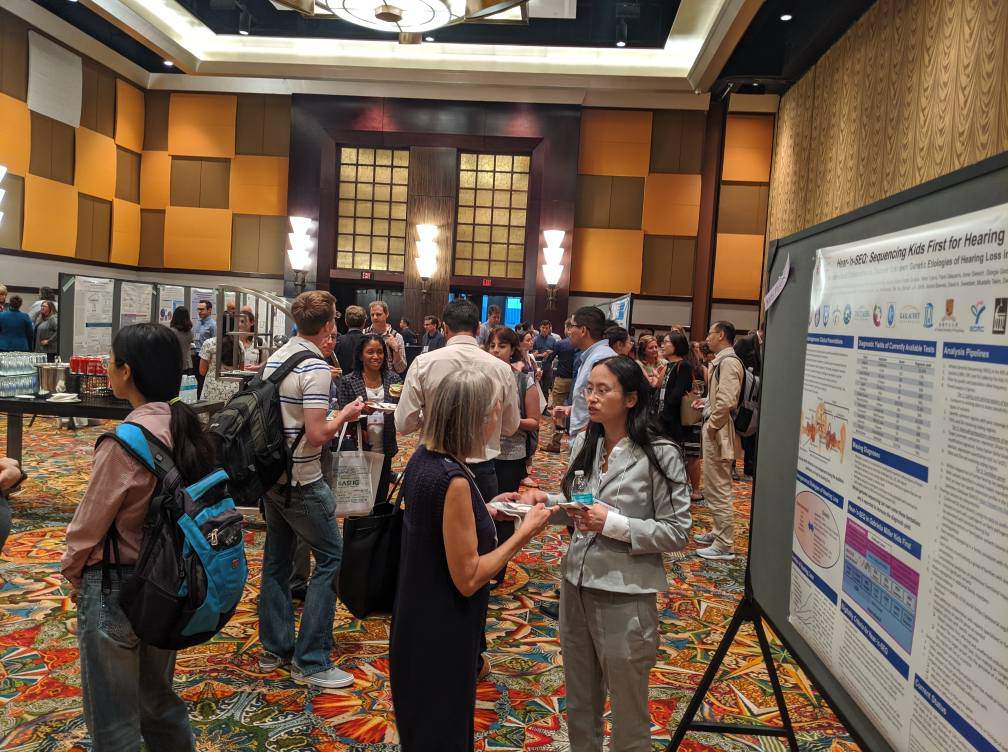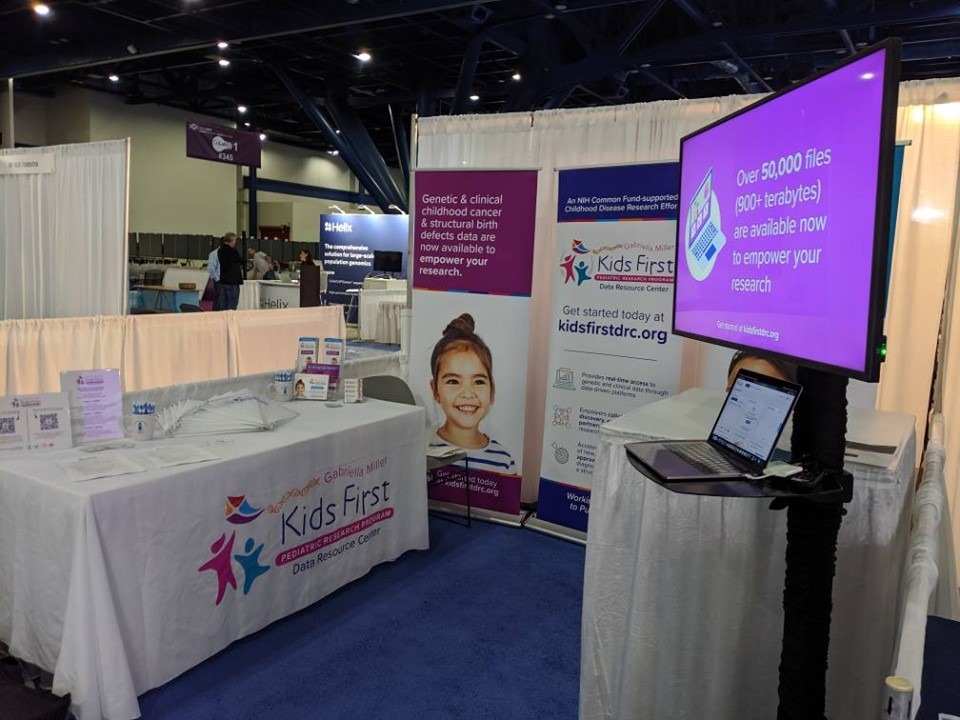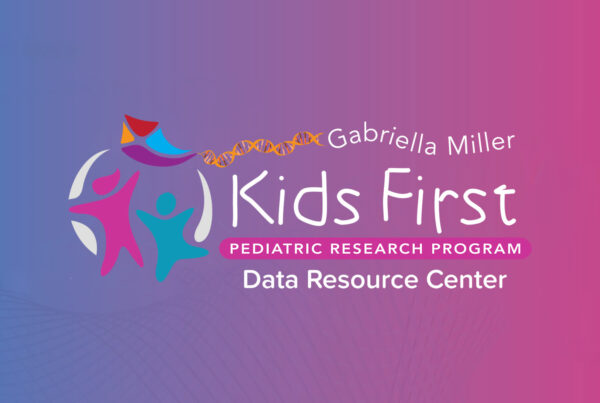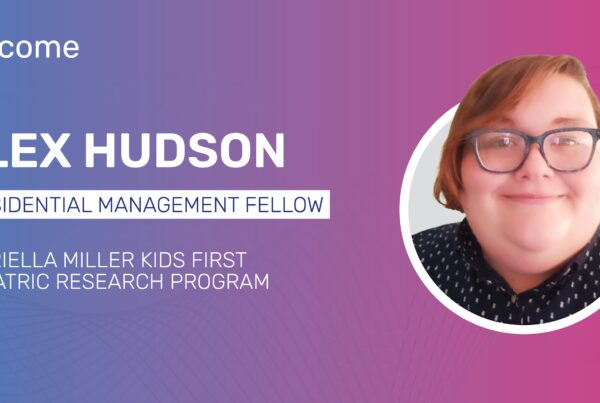TheAmerican Society of Human Genomics (ASHG) is the premiere professional membership organization for human genetics specialists worldwide, including nearly 8,000 members. Each year, the organization’s Annual Meeting represents the largest gathering of human genetics experts in the world.
The2019 ASHG Annual Meeting, held from October 15 to 19 at the George R. Brown Convention Center in Houston, TX, drew a crowd of more than 8,500 attendees, representing foundations and patient advocates, research labs, medical institutions, data scientists, public health agencies, and industry professionals. This diverse collection of human genetics stakeholders gathered to contribute their voices and insights toward advancing our global ability to further understand the human genome and utilize that knowledge toward advancing medical science for the benefit of children and adults the world over.
The National Institutes of Health (NIH) Common Fund-supported Gabriella MillerKids First Pediatric Research Program (Kids First) and the Kids First Data Resource Center (Kids First DRC) once again participated at this meeting, proudly showcasing the significant progress that has been made since launching the Kids First Data Resource Portal in September of last year.
Participation at this year’s ASHG Annual Meeting was kicked off by the Kids First program’s ancillary Kids First Poster Session: Accelerating Pediatric Genomics Research Through Collaboration. Held in concert with the ASHG Annual Meeting for the second time, the event was a great success, doubling in size from last year’s event in San Diego. Held on Tuesday, October 15 at the Hilton Americas-Houston Hotel, more than 40 Kids First investigators and collaborators presented posters showcasing their recent research progress and opportunities for new collaborations toward the rapid discovery of the genetic causes and links between childhood cancers and structural birth defects. Overall attendance for the event reached approximately 400 guests. A full list of the abstracts presented at the Kids First Ancillary Poster Sessioncan be found here.
Additionally, Kids First DRC investigators including Yuankun Zhu, Adam Resnick, Allison Heath, and Deanne Taylor presented live demonstrations of the Kids First Data Resource Portal, including our new Explore Data tool; our clinical, phenotypic, and genomic harmonization workflows; interoperability withCavatica; and more.
From Wednesday, October 16 to Friday, October 18, the Kids First DRC’s Administrative and Outreach Core (AOC) also presented a booth at the ASHG Annual Meeting’s Exhibitor Hall and Poster Area, where meeting attendees had the opportunity to meet with Kids First DRC investigators and data engineers, as well as special guests from the NIH, including representatives from the National Institute for Child Health and Human Development (NICHD), the National Human Genome Research Institute (NHGRI), and the NIH Office of Data Science Strategy’s STRIDES Initiative.
A large number of booth visitors joined us for live demonstrations of our Data Resource Portal, where they were able to view newly-added datasets, analysis and visualization tools, and interoperability with other pediatric genomic data datasets available through the platform.
The Kids First DRC also shared how to quickly register for a free account, and how to apply for cloud storage and compute creditsto enable use of Kids First data to empower research projects on Cavatica.
Over the three-day exhibition, the Kids First DRC interacted with several hundred meeting attendees, including bioinformaticians, data scientists, clinicians, patient advocates, genetic counselors, health industry and public agency representatives, and laboratory scientists. Many clinicians and other researchers were excited to hear that they could quickly log in to freely browse the more than 932 TB of data available on the Data Resource Portal; wanting to know how to get involved with research efforts and how Kids First data can have a positive impact on health outcomes for patients. Many investigators who visited the Kids First DRC’s booth were particularly interested in how to best harness the available data for their research, how to search for specific gene copy number variants, and how they can engage with the NIH Common Fund’s Kids First Program for future research efforts.
Throughout the week-long meeting, a number of Kids First DRC Investigators, program staff, X01 Investigators, and collaborators also presented at ASHG poster sessions and delivered remarks at several ancillary events, platform demonstrations, and other sessions.
Kids First Poster Sessions:
Quantifying Phenotype Similarity for Complex Harmonized Disease Cohorts
Deanne Taylor, Children’s Hospital of Philadelphia; Kids First DRC Principal Investigator
Allison Heath, Children’s Hospital of Philadelphia; Kids First DRC Principal Investigator
Valerie Cotton; NIH Common Fund Gabriella Miller Kids First Pediatric Research Program
_ _
Overcoming Challenges in Identification, Annotation, and Interpretation of Variants in DSD Genes
Emmanuela Delot, Children’s National Medical Center; Kids First X01 Investigator
A Germline Susceptibility Variant in VHL in a Patient with Maffuci Syndrome
Nara Sobreira, Johns Hopkins University School of Medicine; Kids First X01 Investigator
_ _
Sharon Plon & Philip Lupo, Baylor College of Medicine; Kids First X01 Investigators
_ _
Metaphyseal Enchondromatosis with D-2-Hydroxyglutaric Aciduria and Variants in IDH1, IDH2, and EX
Nara Sobreira, Johns Hopkins University School of Medicine; Kids First X01 Investigator
_ _
DataSTAGE Consortium; Kids First Collaborating Partners
Mondo Disease Ontology: Harmonizing Disease Concepts Across the World
Julie McMurry, Oregon State University, Monarch Initiative; Kids First DRC Collaborating Partner
Accelerating Research with The NCBI Sequence Read Archive on The Commercial Cloud
National Center for Biotechnology Information; Kids First Program Collaborating Partner
Kids First Platform Presentations:
Eric Vilain, Children’s National Medical Center; Kids First X01 Investigator, utilizing Kids First Dataset: Disorders of Sexual Development
Variants in the HIF-1 Pathway Are Associated with Ollier Disease and Maffucci Syndrome
Nara Sobreira, Johns Hopkins University School of Medicine; Kids First X01 Investigator, utilizing Kids First Dataset: Enchondromatoses
Open Access to dbGaP New Aggregated Allele Frequency for Variant Interpretation
National Center for Biotechnology Information
Data CoLab Presentation:
National Center for Biotechnology Information
The Kids First DRC’s Administrative and Outreach Core employed a strong promotional campaign over several social media outlets and other digital platforms in order to drive attendance to the Kids First exhibition booth and ancillary poster session. During the week-long meeting, Kids First DRC content reached over 18,000 users on Twitter and Facebook. In the weeks leading up to the meeting, The Kids First DRC also promoted our presence at ASHG via eblasts, blog content, and on social media, reaching roughly 7,200 additional users.
Through outreach efforts including presentations at major conferences like the 2019 ASHG Meeting, the Kids First DRC’s Administrative and Outreach Core continues to foster awareness of and engagement with the Data Resource Portal and encourages researchers, clinicians, and patient advocates to learn more by visiting our website at kidsfirstdrc.org.
Since our last major conference appearance in April of 2019, 3,474 individual users visited the Kids First DRC website to learn more about the program, while nearly 2,000 users visited the Data Resource Portal to explore the data available for research. In the same period, subscriptions to the Kids First DRC email listserv, which provides a source for latest updates from the Kids First DRC and the NIH Common Fund’s Kids First program, increased by 25%.
With sustained awareness efforts directed toward stakeholders across the childhood cancer and structural birth defect research landscape, the Kids First DRC is primed to shepherd this global network of potential collaborators toward awareness of our growing number of datasets, analysis tools, and opportunities for collaboration. Through this increasing awareness and engagement, the Gabriella Miller Kids First Data Resource Center aims to fostering accelerated scientific discoveries that will lead to better treatments and outcomes for child patients across the U.S. and around the world.
To learn more and to register with the Kids First Data Resource Portal, visit us at kidsfirstdrc.org/portal/portal-features/ or contact us at support@kidsfirstdrc.org











